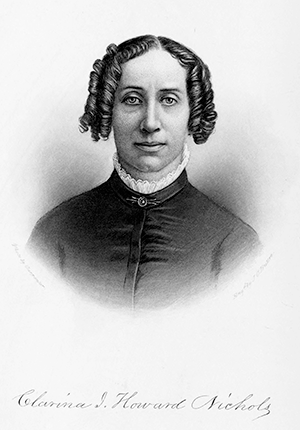Historic Document
Speech to the Women’s Rights Convention, Assembled in Worcester, MA (1851)
Clarina I. Nichols | 1851

Public domain
Summary
Married women’s property rights were a key goal of women’s rights activists, as indicated in the Declaration of Sentiments (1848). But the first married women’s property acts had little to do with women’s rights; they were passed in the wake of the panic of 1837 as a way of putting family property into women’s names to shield it from their husbands’ creditors. Activists had a hand in the passage of later legislation in other states, including New York (1848) and Pennsylvania (1848). These acts, however, were also limited. Instead of eliminating coverture, they modified it, allowing women to own some forms of property, particularly real estate, and protecting it from their husbands’ creditors, but not giving them the rights necessary to manage it, notably the ability to contract, to act as legal agents in their own names, and to claim wages or family property. In this speech, activist and newspaper editor Clarina Nichols states the case for women’s claims to wages and family property, stressing the value of women’s labor, while also critiquing existing laws that (in the absence of a will) gave women only use of a portion of the family estate at the deaths of their husbands. Despite activists’ efforts, these issues remained with states and outside the purview of the U.S. Constitution until the twentieth century, although Nichols’s arguments prefigured those later debates.
Selected by

Laura F. Edwards
Class of 1921 Bicentennial Professor in the History of American Law and Liberty, and Professor of History at Princeton University

Kurt Lash
E. Claiborne Robins Distinguished Professor of Law at the University of Richmond
Document Excerpt
But I would return to woman’s responsibilities and the laws that alienate her means to discharge them. And here let me call your attention to my position, that the law which alienates the wife’s right to the control of her own property, her own earnings, lies at the foundation of all her social and legal wrongs. . . . I refer you to the legal provision for the widow. The law gives her the use only of one third of the estate which they have accumulated by their joint industry. I speak of the real estate; for in the majority of estates, the personal property is expended in paying the debts and meeting the expenses of settlement. Now I appeal to any man here, whose estate is sufficient to support either or both in comfort, and give them Christian burial, and yet is so limited that the use of one third of it will support neither, whether his wife’s interests are equally protected with his own, by the laws which “settle” his estate in the event of his dying first? Let me tell you a story to illustrate the “support” which, it is claimed, compensates the wife for the alienation of her earnings to his control of the husband. In my native town lived a single sister, of middle age. She had accumulated something, for she was capable in all the handicrafts pursued by women of her class. She married a worthy man, poor in this world’s goods, and whose children were all settled in homes of their own.
She applied her means, and by the persevering use of her faculties, they secured a snug home, valued at some five hundred dollars, he doing what his feeble health permitted towards the common interest. In the course of years he died, and two thirds of that estate was divided among his grown-up children; one third remaining to her. No, she could only have the use of one third, and must keep it in good repair, — the law said so! The use of two hundred dollars in a homestead, on condition of “keeping it in good repair,” was the legal pittance of this poor woman, to whom, with the infirmities of age, had come the desolation of utter bereavement! The old lady patched and toiled, beautiful in her scrupulous cleanliness. The neighbors remembered her, and many a choice bit found its way to her table. At length she was found in her bed paralyzed; and never to the day of her death — three years — could she lift her hand or make known the simplest want of her nature; and yet her countenance was agonized with the appeals of a clear and sound intellect. And now, friends, how did the laws support and protect this poor widow? I will tell you: They set her up at auction, and struck her off to the man who had a heart to keep her at the cheapest rate! Three years she enjoyed the pauper’s support, then died, and when the decent forms of a pauper’s burial were over, that third was divided — as had been the other two thirds — among her husband’s “well-to-do” children. (Great sensation.) . . . . Here the law giving the control of the wife’s earnings to the husband, is made legal reason for cutting her off at his death with a pittance, so paltry, that if too infirm to eke out a support by labor, she becomes a pauper! . . . Having legalized the husband’s claim to the wife’s earnings, by a law of universal application, our legislators have come to legislate for widows on the ground that they have no property rights in the estates which have swallowed up their entire earnings!
O men! in the enjoyment of well-secured property rights, you beautify your snug homesteads, and say within your hearts, “Here I may sit under my own vine and fig-tree; here have I made the home of my old age.” And it never occurs to you that no such blissful feeling of security finds rest in the bosom of your wives. The wife of a small householder reflects that if her husband should be taken from her by death, that home must be divided, and a corner in the kitchen, a corner in the garret, and a “privilege” in the cellar, be set off to her use, as if she were a rat! (Great sensation.) Or if she chooses the alternative of renting her fractional accommodations, and removing to other quarters, her sweet home associations — all that is left of her wedded love — are riven. The fireside that had been hallowed by family endearments, the chair vacant to other eyes, but to hers occupied by the loved husband still, all are desecrated by the law that drives her from the home which she had toiled and sacrificed to win for herself and loved ones, and she goes out to die under a vine and fig-tree strange to her affections; and it may be, as in the case before mentioned, to find them wither away like Jonah’s gourd, in absolute pauperism!




